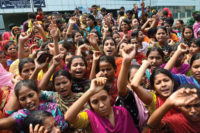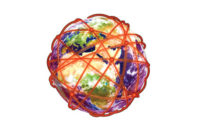In January 2012, following a series of devastating articles in the New York Times about abusive and dangerous conditions in its supply chain, Apple joined the corporate-funded Fair Labor Association (FLA). Apple commissioned the FLA to conduct audits of three of the Chinese factories operated by its principal supplier, Taiwan-based Foxconn.
In March 2012, the FLA released its audit report of the three factories, confirming what grassroots non-governmental organizations had been saying for years: Apple’s supplier factories are unsafe, unhealthy, and had engaged in numerous illegal practices, including excessive overtime, wage theft, abuse of student interns, and physical harassment of the young migrant workers who live in massive dormitories inside Foxconn compounds. (See box for links to reports.)
One startling revelation in the FLA reports was that two of the three audited factories – Fu Tai Hua Industrial Co. Ltd’s plants in Guanlan and Longhua, China – are “OHSAS 18001 certified” despite having no functioning health and safety programs whatsoever. The certification was reportedly awarded by the Swiss-based SGS (Societe Generale de Surveillance), which has U.S. offices in New Jersey.
Phantom program
The business-friendly FLA reported that “although there is an HSE [health, safety and environment] committee in place, this committee is not active. There are no periodic meetings or internal audits conducted by this committee. There is no worker participation and integration on ongoing HSE efforts, as there are no elected worker representatives on the HSE committee. No system for keeping track of sickness and working days lost to sickness. Risk analysis report does not cover all the hazards and risks in the factory.”
The audit report listed the plants’ OHS program deficiencies in great detail, including:
- “No Lock out-Tag out (LOTO) procedure for protecting workers;”
- “No procedure for controlling working conditions and protecting workers from potential risk of falling when they work at heights;”
- “List of machines that need guarding is missing;”
- “No procedure for controlling thermal comfort conditions of the workers [in tropical southern China];”
- “Incomplete Material Safety Data Sheets (MSDS) of chemical substances used;”
- Inadequate and/or improper personal protective equipment (gloves, hearing protection, shoes), including the use of “carbon layered paper masks” by workers handling solvents and other chemicals;
- Inadequate emergency plans and non-code-compliant exits, fire protection systems, and lack of fire drills;
- No ergonomics program – evaluation, controls, training – for highly repetitive assembly work performed 11 to 16 hours a day;
- Inadequate number of toilets (20-24 toilets in assembly areas with 1,500-2,000 workers) below legal requirements.
Issues not examined
Despite the plants’ OHSAS 18001 certification, the FLA report noted “most managerial staff interviewed mentioned that these issues have never been raised during external OHSAS 18001 audits.”
The FLA report also noted that there is “no active worker representation and participation on HSE committee” and “no active system for encouraging workers to participate.” The FLA found that “management is not aware of possible legal and financial consequences of work accidents and occupational diseases that may happen within the factory.”
These Foxconn/Apple plants, certified under the OHSAS 18001 system as having effective workplace health and safety management systems, in fact, have OHS programs in name only, and what’s on paper never reaches the factory floor.
Yet, like scores of other supplier factories in global supply chains, Foxconn’s factories have been certified by SGS and dozens of other for-profit firms ever anxious to keep their factory operator customers happy. The certifications also supply international retail brands with a ready response to the numerous and ongoing reports, in the news media and by grassroots worker rights organizations, documenting that their supply chains are full of unsafe and illegal sweatshops.
Stand up to the sham
Unless the OHS profession – through its associations, its journals, and its conferences –documents and rejects this “gaming the system” by for-profit and non-profit consultants who “certify” safe conditions, when they do not exist, to meet the public-relations needs of transnational corporations, it will rightly be seen as complicit in a deadly sham.
For example, Social Accountability International (SAI) developed its own corporate social responsibility code – “SA 8000” – which includes OHS measures similar to OHSAS 18001. SAI makes its money training employees of other companies to certify their clients’ plants as “compliant with SA 8000,” and has made millions of dollars over the past decades producing SA 8000 auditors who work for consulting companies worldwide.
In August 2012, the Italian firm RINA Group, using their SAI-trained auditors, gave the Ali Enterprises plant in Karachi, Pakistan, a clean bill of health and a SA 8000 certification. Three weeks later, 258 workers were killed in a fire where workers were trapped behind locked doors and barred windows after damaged electrical systems ignited improperly stored flammable materials in the “SA 8000-certified” factory.
The Ali Enterprise factory, producing garments for German retailer KiK, also had been inspected by UL Responsible Sourcing three times between 2007 and 2011. In December 2011, UL Responsible Sourcing reported the factory was in compliance with all national laws and the KiK corporate code of conduct, including on health and safety issues.
Hiding dangerous conditions
| FLA, Apple Reports on Working Conditions at Apple Suppliers |
|
Fair Labor Association, “Foxconn Investigation Report,’ March 28, 2012
Fair Labor Association, “Foxconn Verification Status Report,” August 21, 2012 Apple, “Apple Supplier Responsibility; 2013 Progress Report,” January 25, 2013 |
Certifications by SGS, SAI or UL Responsible Sourcing are one way that irresponsible factory operators like Foxconn and Ali Enterprises are able to hide dangerous conditions that kill and maim, and also provide their international brand retailers like Apple and KiK with “plausible deniability” when consumers and human rights advocates demand that workers should not have to die making blue jeans or iPhones.
Unfortunately, while workplace health and safety issues were prominently featured in the March 2012 FLA reports on Foxconn’s three facilities, these issues have virtually disappeared from both FLA and Apple’s follow-up reports.
In the FLA August 2012 ”Verification Report” on Foxconn’s Guanlan factory, for example, only 14 of the 26 specific H&S recommendations made in the March 2012 report were addressed at all, and the “verifications” only partially touch on the recommendations, and the report contained no details on how even these 14 recommendations were “completed.”
Apple’s February 2013 “Supplier Responsibility” report has no information on health and safety at the Foxconn plants or any supplier factory. In the seven short paragraphs on the health and safety report, Apple notes the number of “factory assessments” done in 2012 (40), and the number of trainings done with Apple employees and supplier plant managers – but no information on what, if anything, has changed in the hundreds of Apple’s supplier factories.
A matter of credibility & reputation
The role of OHS professionals is to ensure effective OHS programs, not only on paper but also on the factory floor. Effective programs cannot be implemented without active participation by informed and knowledgeable workers. The OHSMS certification programs at the Foxconn plants and, no doubt, many others, are a threat to achieving those goals, and also threaten the integrity and reputation of the OHS profession itself.
| Non-Governmental Organization Reports of Working Conditions at Apple |
|
SACOM, “Apple fails in its responsibility to monitor suppliers,” February 26, 2013 |



